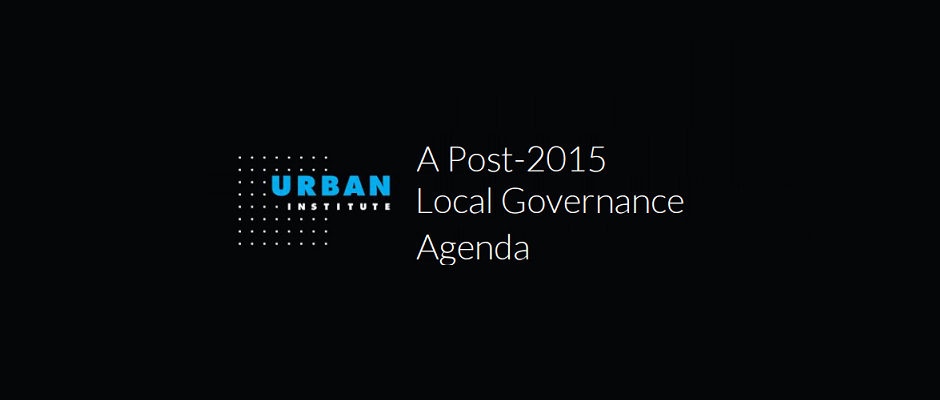
The assassination of President Jovenel Moïse, and the political crisis that followed, have, understandably, attracted a lot of media attention. But for most Haitians, the dramatic developments in the capital city have less bearing on their daily lives than whether or not their local governments are able to provide them with such basic services as trash removal, water and sanitation, and healthy and safe marketplaces.
Far from the tumult at the presidential palace, people are struggling to keep their families safe, when simple daily tasks like taking a drink of water or a trip to the market can pose grave dangers.
Of course, the two issues are related. Historically, Haiti’s governance has been highly centralized, and the powerful executive branch has often been under military control. This has blocked the emergence of genuinely autonomous local governments; accordingly, their capacity to provide public services depends more on relationships with national authorities than with their own constituents.
Haiti’s 1987 constitution codified extensive reforms, reinforcing democratic representation and the rule of law, in addition to laying the foundation for an innovative model of civic participation and service provision. However, over the last 34 years, Haiti’s parliament has failed to pass the legislation necessary to make decentralization a reality, so local governments remain financially and politically dependent on the central administration.
In response to the weak decentralization context, the LOKAL+ project, financed by the United States Agency for International Development (USAID), was developed to help make communes (district-level governments) more autonomous through effective decentralization. LOKAL+ (Limiyè ak Òganizasyon pou Kolektivite yo Ale Lwen Plus) ran from January 2013 to January 2018. It aimed to improve municipal services by tackling a range of issues including strategic planning, tax collection, finance and program management, prioritizing services and community awareness. USAID has been financing projects in Haiti to strengthen local governments capacity for over 10 years.
In 2021, Oxfam released a research paper that analyzes the LOKAL+ effort to effect decentralization; the results are mixed.
The LOKAL+ project aimed at decentralizing governance
The purpose of the LOKAL+ project was to support district-level governments (known locally as communes) in achieving greater autonomy through effective decentralization. It aimed to enhance municipal services through improved strategic planning, tax collection, finance and program management, priority setting, and community awareness. LOKAL+ was the third in a series of USAID projects over the past decade intended to strengthen local governments’ capacity.
In order to help identify the most promising path forward for aid providers—particularly those committed to direct partnerships between donors and local institutions—Oxfam carried out research in three of the 10 communes that received LOKAL+ resources: Kenscoff, located near the capital; Limonade, in northern Haiti; and Saint-Marc, a port city in west-central Haiti. Across the communes and the capital, Oxfam interviewed more than 200 people—including local officials, experts on local government, and representatives of community organizations—and organized focus groups of people who pay local taxes.
Oxfam’s research: Did LOKAL+ make a difference?
It is widely accepted that aid in the form of charitable gifts from outside sources is unlikely to eradicate poverty or result in sustainable development. Aid programs have a better shot at long-term success if there is full participation by local leaders in the design, implementation, and evaluation of development initiatives.
In other words, country ownership is a key principle of aid effectiveness. Rather than hire a US-based company to develop financial software for the project, USAID chose Haitian-based Solutions S.A.; USAID officials and project implementers identified their choice of a Haitian company as an important contribution to local ownership.
The Solutions product, known as CIVITAX, provided the means for communes to manage their budgets effectively and harmonize their accounting systems with those of the central government; this could be a step forward in strengthening the participating communes, and has the potential for sustainable impact.
Officials in the study communes said that LOKAL+ also helped strengthen local mayors’ technical, administrative, and financial capacity, and gave them tools to boost local tax collection.
However, the project operated in an extremely difficult context: wealthier Haitians enjoy a range of tax exemptions and widely engage in tax evasion. That shifts the tax burden onto lower-income people, who are also struggling with the near collapse of the country’s economy over the past two years.
People interviewed said that LOKAL+ helped revive a sense of citizenship in the communes, creating an environment in which citizens could see themselves as the protagonists of development. But interviewees felt that the project needed to go further and contribute directly to reducing extreme poverty and inequality.
Unfortunately, a diverse group of the people interviewed agreed that the project did not lead to tangible, sustainable improvements in local public service provision.
Entrenched power dynamics stymie LOKAL+ initiatives
For the past three decades, Haiti has been a theater of chronic political instability. Elections never take place on time; and, despite constitutional requirements and pressure from constituents, presidents routinely appoint local officials who should rightly be chosen through an electoral process. Patronage politics undermine any semblance of rule of law–and this has had devastating impacts on public policy and sustainable development.
One result is a regressive and corrupt tax system: for every 100 Haitian gourdes (the local currency) due to the state, the government collects only 14. This is the result of legal tax exemptions, but also of illegal tax evasion and other forms of corruption.
The rich benefit most from this system, and one result is staggering inequality: the poorest 20 percent of the population barely holds one percent of the country’s wealth, while the richest 20 percent owns nearly two thirds. Tax reforms and accountable fiscal policies are crucial to helping Haiti’s struggling majority take steps out of poverty.
Haiti needs radical reforms that institutionalize good governance, rule of law, and ethical conduct on the part of public officials. This requires parliamentary oversight, independent auditing bodies, and citizen watchdog groups that hold the state accountable.
LOKAL+ made substantial efforts to facilitate decentralization of public services and to support local officials in collecting taxes fairly. However, the project fell victim to a centralized system that refuses to cede power to local governments: while the project strengthened local capacity, the gains didn’t translate into the tangible community improvements it was aiming for.
Entrenched patronage politics, and the inequalities they enable, constitute a cancer on Haiti’s body politic; the cure advanced by LOKAL+ was a modest step in the right direction. It will take a united effort on the part of Haiti’s central and commune governments and civil society to shift the country onto a more positive trajectory.
The international aid community should lend a hand, but to provide true democratic ownership of development, every initiative needs to prioritize the leadership of civil society groups and responsible government bodies.
LOKAL+ set out to give communities a stronger voice in the policies that affect them; despite the daunting odds, future aid providers need to take up that torch and carry it as far as they can. Haitians deserve a future of security and equality; every step down the path to meaningful democracy brings us closer to making our dreams a reality.
Full Oxfam Research Paper: Joseph, Tonny, “Boosting communes’ autonomy as a step towards decentralization: the case of LOKAL+”, Oxfam Research Backgrounder series, (2021): https://www.oxfamamerica.org/explore/researchpublications/empowering-local-governments-the-lokal-project-in-haiti
The original blog post by Tonny Joseph can be found here.
Photo credit: Saint Louis Health Center. Used under Creative Commons license (CC BY 2.0).




